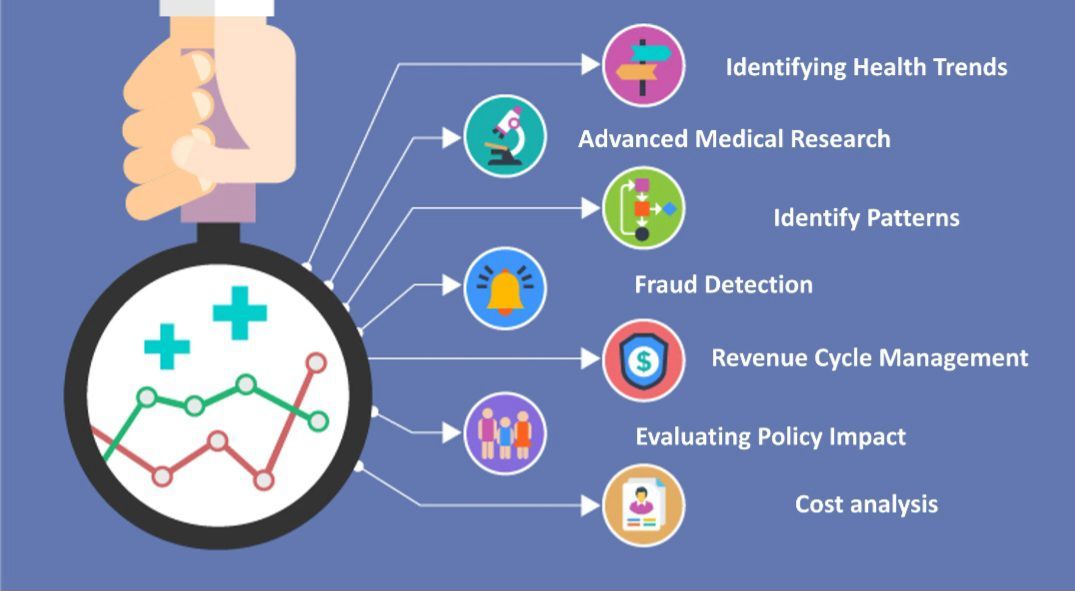
When we think about hospitals and the healthcare field, we often focus on doctors, nurses, and support staff. However, are they the only ones who play a part in the larger healthcare ecosystem?
Obviously not! There’s another important group that we often don’t see much and appreciate for the effort they put in – the research and analytics (R&A) team.
These people are like behind-the-scenes workers in movies. They put a lot of effort into making the patients' lives better by handling huge amounts of data, such as records and test results.
They constantly review relevant data to find important information that help doctors understand diseases more clearly. This enables doctors to plan new ways to treat the patients and improve the quality of healthcare.
Even though they work behind the scenes, their contributions make healthcare better for everyone.
These people analyse lots of data and information, like patient records and test results. They always find patterns and trends that help doctors understand the diseases better, find new treatment plans, and improve how they provide quality care for the patients.
These behind-the-scenes heroes look at lots of data and information, like patient records and test results. They find patterns and trends that help doctors understand diseases better, find new treatments, and improve how they take care of patients.
Even though we don't see them, their work is very important for making medicine better for everyone.
The Data Explosion in Healthcare
The one interesting fact about modern healthcare is that it creates and saves huge amounts of patient data. Studies reveal that the average medical data doubles every two years, which can sometimes lead to confusion.
The research and analytics (R&A) teams are like data detectives. They look at patient records, clinical trial results, and genetic information to find important insights. Their job isn't just to manage this data but to understand it.
By carefully studying this data, R&A professionals help doctors provide better care, make hospitals run more smoothly, and support new medical research.
Beyond Treatment: Prevention and Public Health
R&A teams don't just help treat illnesses, they also work on preventing them and keeping the public healthy. They study how diseases spread, look for things that can cause diseases, and analyse health trends.
This helps them predict and stop future health problems. During the COVID-19 pandemic, data experts tracked how the virus spread, evaluated how well health measures were working, and suggested strategies for vaccine distribution.
Their work was very important for making rules and saving lives.
Personalised Medicine: The Future of Healthcare
Imagine knowing if you might get a disease before you feel sick. This is becoming possible thanks to the work of R&A teams. They are important in making personalised medicine, which means creating treatments and prevention plans that fit each person's unique genetics and health.
By analysing a lot of data, R&A teams find patterns that were previously unseen. This way, treatments work better and have fewer side effects, making healthcare more personal and effective.
The AI Revolution in Healthcare R&A
Artificial intelligence (AI) is changing many industries, including healthcare. AI can analyse huge amounts of data quickly and find hidden patterns and connections.
This helps make big discoveries in diagnosing and treating diseases. For R&A teams, AI is very important. It helps predict disease outbreaks, discover new drugs, and even diagnose challenging conditions. By using AI's power, R&A teams are making amazing things possible in healthcare.
A Diverse Team of Professionals
The R&A team is made up of many different types of professionals, like data scientists, statisticians, epidemiologists, and computer programmers. They all come from different backgrounds but work together to turn complex data into useful information.
They need to understand both medical science and advanced data analysis, so they often collaborate in teams to solve significant healthcare problems.
The Impact of R&A on Healthcare
The R&A teams perform many important tasks. They improve patient care by identifying the best ways and solving problems. Their research helps create new treatments and drugs faster. They also track and predict disease patterns, which helps with public health efforts. Plus, they are helping to create personalised medicine, which means making healthcare more accurate and specific for each person.
Recognizing the Silent Partners
Whenever you think about healthcare workers, remember the behind-the-scenes professionals as well. They use data to help us prevent, find, and treat diseases.
Their work is very important for medical science and helping patients get better care.
Even though they don't treat patients directly, their work helps the whole healthcare system. As new challenges arise, their contributions will be even more important in helping everyone stay healthy.
Doctors, nurses, and technicians often receive a lot of attention, but the research and analytics (R&A) team is also very important in supporting healthcare from behind the scenes.
Data experts look through big piles of information to find patterns that help make patient care better, support research, and stop health problems from happening later.
Their work in personalised medicine and the use of artificial intelligence is transforming our approach to healthcare, making treatments more effective and personalised to individual needs.
The R&A team's efforts are essential for making healthcare smarter, more efficient, and more effective.
As we continue to face new health challenges, their contributions will become even more important, ensuring that healthcare evolves to meet the needs of everyone.
As we consider the future of healthcare, how can we better support and recognize the vital contributions of the R&A team in creating a healthier world for all?

The Right Way to Take Risks: Lessons From My Journey

The Role of Patience in Achieving Success in Healthcare Technology

How Job-Hopping Slows Your Progress and What to Do Instead
